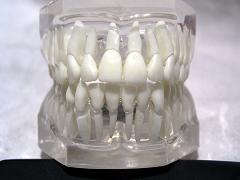Xylitol reduces risk of cavities
Feb 15, 2007 - 10:26:36 AM
, Reviewed by: Dr. Priya Saxena
|
|
|
A single higher intake of xylitol for a limited time reduced the degree of acidity in plaque between teeth.
|
By Swedish Research Council,
[RxPG]
 |
| The sugar substitute xylitol affects the bacterial composition of the oral cavity even in low doses. |
The sugar substitute xylitol affects the bacterial composition of the oral cavity even in low doses. On the other hand, a relatively high intake is needed to counteract the production of acid between the teeth, according to Pernilla Lif Holgerson in the dissertation she will defend at Umeå University in Sweden on February 23.
Xylitol is a sugar alcohol that is produced by reduction of the sugar xylose, or wood sugar. Xylitol occurs naturally in fruits and berries, such as pears and strawberries. It is used in sugarless sweets, above all in chewing gum and lozenges. The dissertation studies what effects the substance has on the ecology of the oral cavity and its role in preventing tooth decay (caries). In a series of studies on children and adolescents, samples of saliva and plaque were examined. Among other findings, it was determined that a daily intake of 3.4 grams of xylitol was sufficient to change the consistency of the bacteria, but this did not lead to a lower production of lactic acid in plaque. In another study it was shown that a single higher intake of xylitol for a limited time reduced the degree of acidity in plaque between teeth.
In a field study involving 128 children aged 712, the subjects were asked to chew gum three times a day, with a total daily dose of 6.0 grams of xylitol. The amount of plaque and the production of lactic acid declined dramatically during the trial period. After four weeks, the proportion of caries-producing bacteria was down by a third, but six months afterward the values had returned to the original levels. Despite the relatively high dose of xylitol used, no negative effects were reported, such as stomach troubles.
Products with xylitol as the sole sweetener are uncommon on the Swedish market today. In the most common sugarless products, xylitol accounts for roughly a third of the sweetening.
The studies nevertheless warrant the following recommendations:
A daily intake of xylitol is recommended as a supplement for patients at high risk for tooth decay.
Xylitol products that actively stimulate the secretion of saliva should be the first choice, such as chewing gum.
About 6 g of xylitol per day is needed to counteract the production of acid and thereby reduce the risk of cavities.
The daily intake should be distributed over at least three occasions.
The products should contain as much xylitol as possible and not be mixed with other sweeteners.
Advertise in this space for $10 per month.
Contact us today.
|
 |
|
Subscribe to Dental Newsletter
|
|
|
|
Additional information about the news article
|
Pernilla Lif Holgerson is a dentist and doctoral candidate at the Department of Odontology, Division of Pedodontics, phone: +46 (0)90-785 62 48; cell phone: +46 (0)70-224 34 61; e-mail: [email protected] .
The dissertation will be submitted on Friday, February 23, at the Department of Odontology, Umeå University. It is titled: Xylitol and its Effect on Oral Ecology¬-Clinical Studies in Children and Adolescents.
The public defense will take place at 9:00 a.m. in Hall B, 9th floor, College of Dentistry. The external examiner is Associate Professor Eva Söderling, Institute of Dentistry, Åbo University, Åbo, Finland.
|
|
Feedback
|
For any corrections of factual information, to contact the editors or to send
any medical news or health news press releases, use
feedback form
|
Top of Page
|



